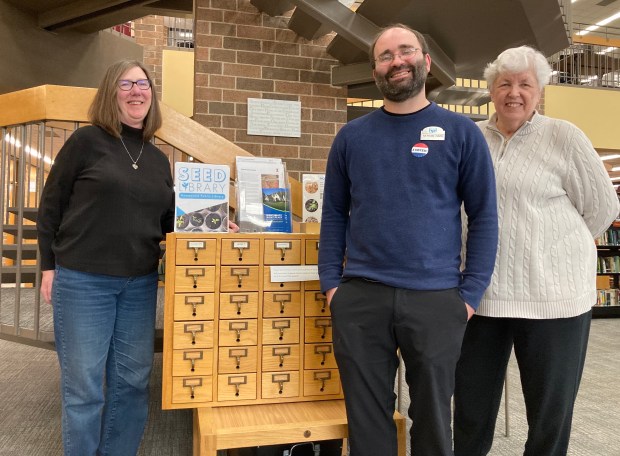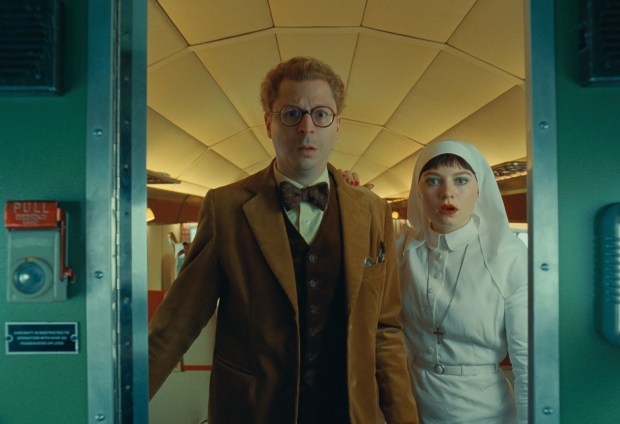With the spring planting season underway, area libraries invite patrons to check out something besides the latest new bestseller or DVD – seeds.
Housed in repurposed card catalogs, seed libraries feature herb, vegetable, fruit and flower seeds donated by participants and seed companies as well as some stock purchased by the libraries.
At the Homewood Public Library, the seed library was inspired by adult services librarian Jill Postma’s son, a master gardener who has worked for the Field Museum, Morton Arboretum and the Save Bell Bowl Prairie project in Rockford, among other plant-inspired jobs and volunteer positions.
“He was always talking about native species,” Postma said, “and recommended a new state flower (the Kankakee Mallow). So he said native species should be planted. I saw other libraries were doing it like Flossmoor and Midlothian.”
Although Postma is not a gardener herself, it runs in her family. “My mom was a rose tester from Jackson Perkins, so it skipped a generation. It’s a well-known company that specializes in roses,” she said.
Homewood’s seed library began in 2019, just before the pandemic stalled everything, explained Nathan Hare, head of adult services. “For a while we put a cart out in our entry area that was covered, so books were given away, and we put seeds out there so people could take them.”
Postma and another librarian in adult services, Margaret Novak, manage the seed library. “I do the dirty work,” Postma said. “The two of us keep an eye on it and the signage.”
The catalog, housed on the library’s main floor, offers several varieties of seeds. “It kind of depends on what’s made available,” Postma said. “Lately a volunteer donated a whole bunch of seeds for peas, and someone else donated marigolds.”
Both she and Hare have noticed more participation with patrons this year. “That’s what’s taken off this year – donations,” Hare said.
“That’s the whole idea of the seed library. You want to have people take seeds but also give back,” Postma explained, adding that she likes that they are promoting more of the native plants, “so keeping our plantings safe from the ones that take over.”
Hare noted that it’s been a trend with the library’s grounds, too, which contain more native plants.
They hope to expand the offerings with a propagation station, which was Novak’s idea. “If the seed library is ‘Take a seed, leave a seed,’ the propagation station is ‘Take a cutting, leave a cutting.’ More along the lines of an exchange or swap,” Hare said, adding that they are working on some shelving for it. “We’re hoping to get it this year.”
Participants don’t have to have a library card for Homewood or any other library. “We don’t check,” Postma joked.
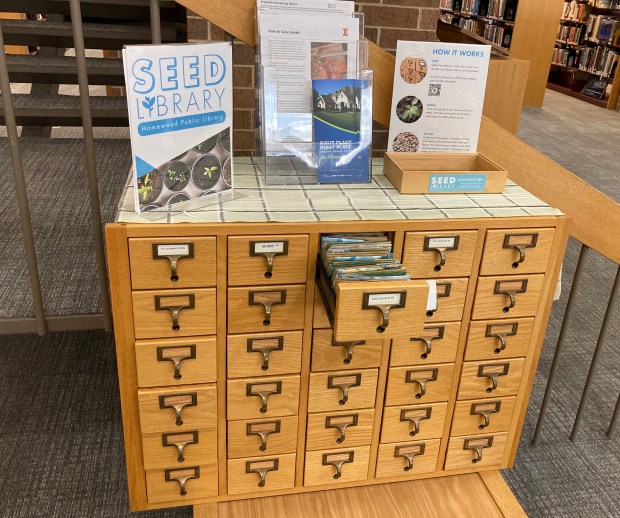
Sustainability is also important at the Park Forest Public Library, which also started its seed library in 2019. “The seed donations are a collective effort between the library staff, the Sustainability Office and the Park Forest Environment Commission,” said Carrie Malfeo, sustainability coordinator for the village of Park Forest.
“The library maintains and advertises the seed library. The Sustainability Office advertises and requests seed donations. The Environment Commission hosts a local food systems expo to connect farmers and eaters to support local food systems,” she said. “A raffle is held at that event, and all the proceeds go to purchase seeds for the library.”
Malfeo said people can get involved by picking up a free packet of seeds, growing local produce, herbs or flowers and telling a friend. An important part of the cycle is harvesting some seeds at the end of the season to donate back to the seed library.
The seeds fulfill a true need in the community, she said, adding that fruits and veggies are the most popular seeds “as Park Forest is a food desert.”
Seeds at the Blue Island Public Library, which have been available since a few years before the pandemic, are maintained by Leah Rozendaal, who works in the circulation department and describes herself as “gardening adjacent.”
“I have people in my life who garden, so I know a decent amount about it but I don’t currently have a garden,” she explained. “I have had gardens in the past. We’ve tried tomatoes and different things like that around the house.”
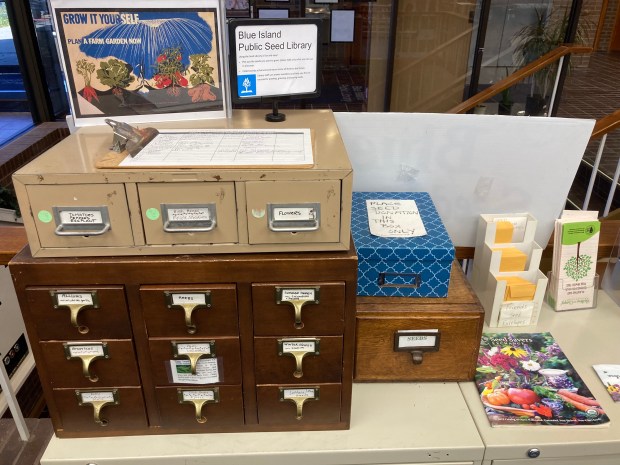
Rozendaal inventories the existing seeds and new donations, which get put in a special box. “I’ll go through there and repackage if necessary. If someone gives a bulk donation, I’ll repackage it,” she said. “For example, I have a couple of ziplock bags of radish seeds, which would be far too many for one person. So we’ll put them in seed envelopes. … If we do an inventory, I’ll solicit donations. We have companies that give us donations.”
She organizes the drawers in the catalog, which was repurposed for the seed library. “The envelopes fit in really well. It’s a throwback to the days of the card catalog,” she said.
Rozendaal recently put radish seeds at the top of the drawers because they can be planted early. She also replenishes low stock, such as when flower seeds are sparse. “It’s exciting in spring because you can put things in the ground, especially with the mild spring we’re having,” she said.
“Flowers are very popular, especially native flowers,” she added. “We have some native grasses, anything from radish, corn, pumpkins. A lot of times you’ll buy a package of pumpkin seeds and you’ll only need half of them. People will bring them in.”
The library sometimes starts seeds inside, such as cucumbers and tomatoes, and gives them out in the spring. “Maybe I’ll do tomatoes. It’s good to give them a head start,” Rozendaal said.
She practices what she preaches, such as with the library’s butterfly garden. “We put it in in cooperation with Brookfield Zoo so we do harvest seeds out there. I cut off the deadheads and I sort those things and put them in packaging, too,” she explained. “ That’s the idea of the seed library is people plant them and when they harvest they can bring them back in and donate that. So we’ll do that work from our own butterfly garden.”
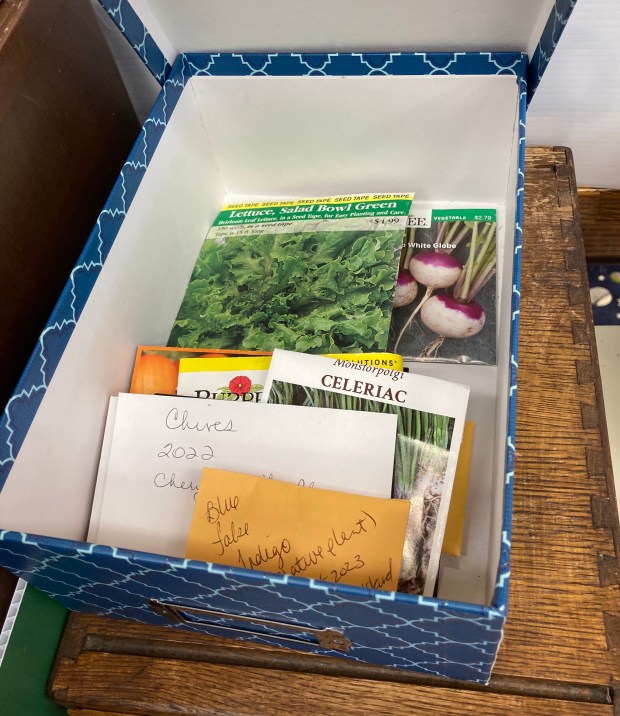
The library has done a spring kickoff day in the last couple of years in conjunction with community gardens that the Park District manages. “Someday it would be fun to have a garden plot where we plant pumpkins for people to use in the fall,” Ronzendaal mused, adding that the University of Illinois Extension Service does a children’s gardening program at the library in the spring and summer.
The seed library is free to use. “It’s supported by Friends of the Library, so there’s a way to sign up to be in Friends if you wanted to provide a little extra support,” Rozendaal said. “We ask that people take as many seeds that they’ll use this season and harvest and bring them back.”
Sometimes the seed garden yields unexpected blessings. “The local Montessori school brought in some seed packages that they collected and they drew the art for the packages. I found it so delightful — the school getting together and making the packages. It’s a really fun way of connecting with the community,” she said. “I’m a sucker for kid drawings.
Other seed libraries can be found in the Flossmoor, Palos Park and Evergreen Park public libraries. They welcome participants from throughout the area.
Melinda Moore is a freelance reporter for the Daily Southtown.


